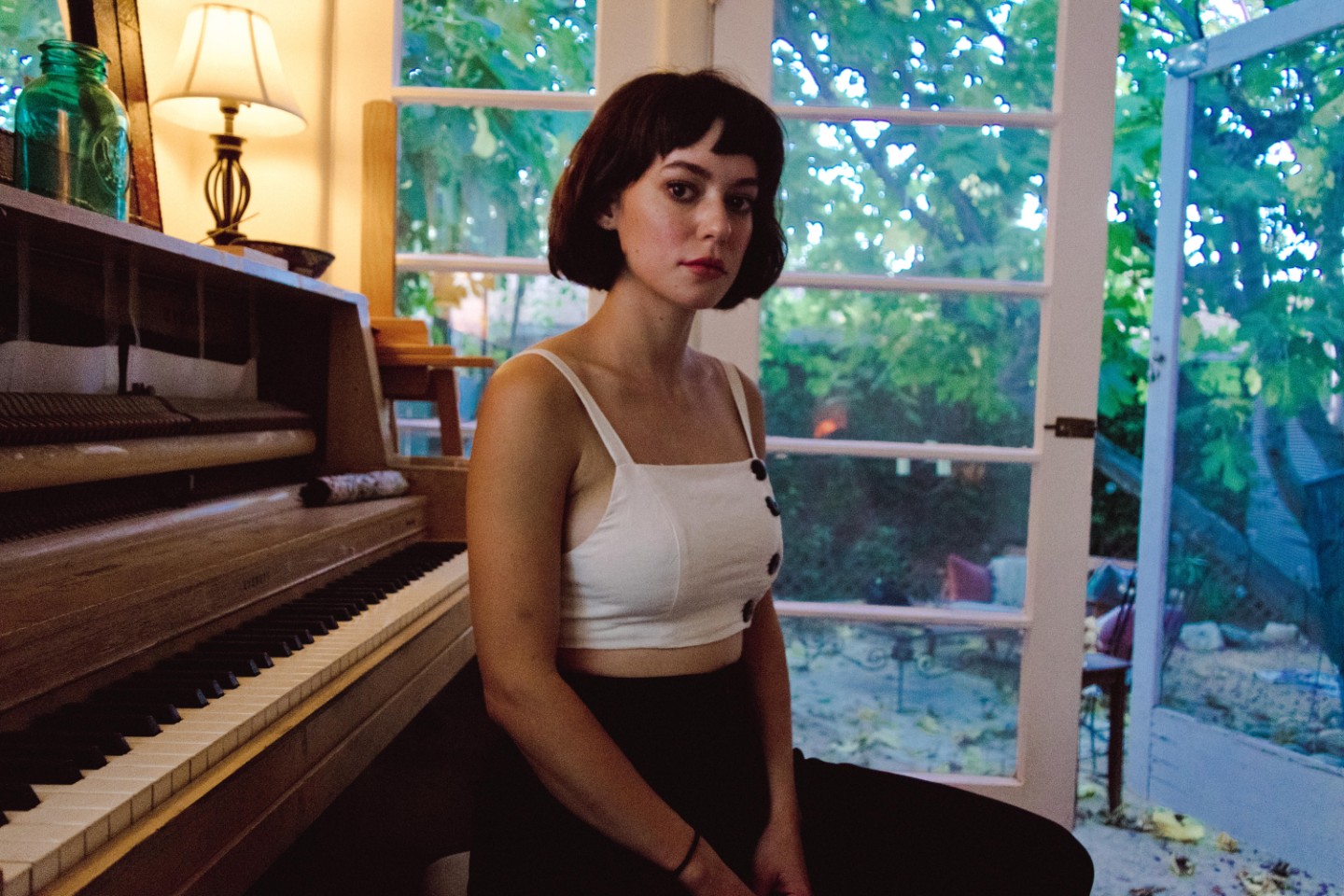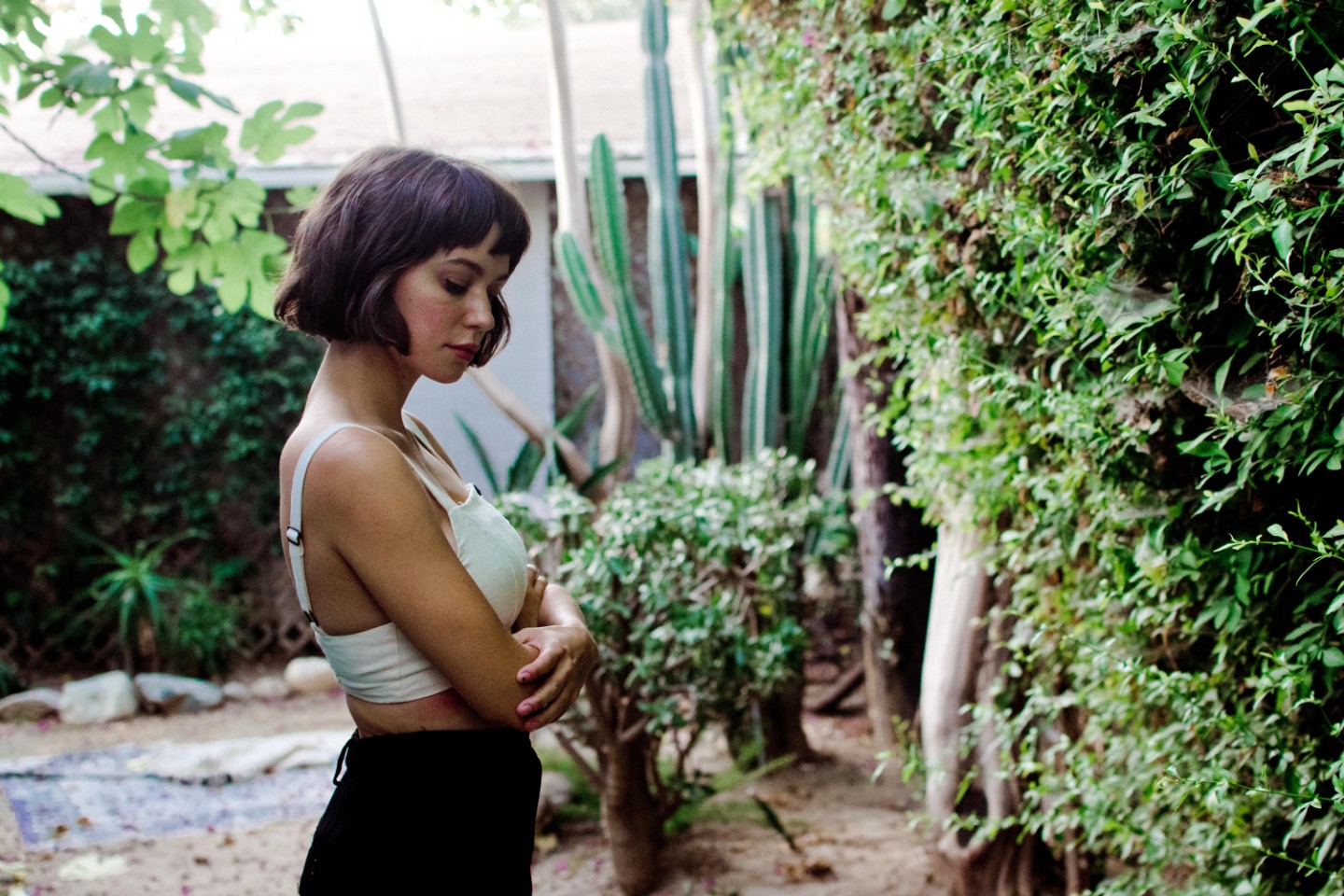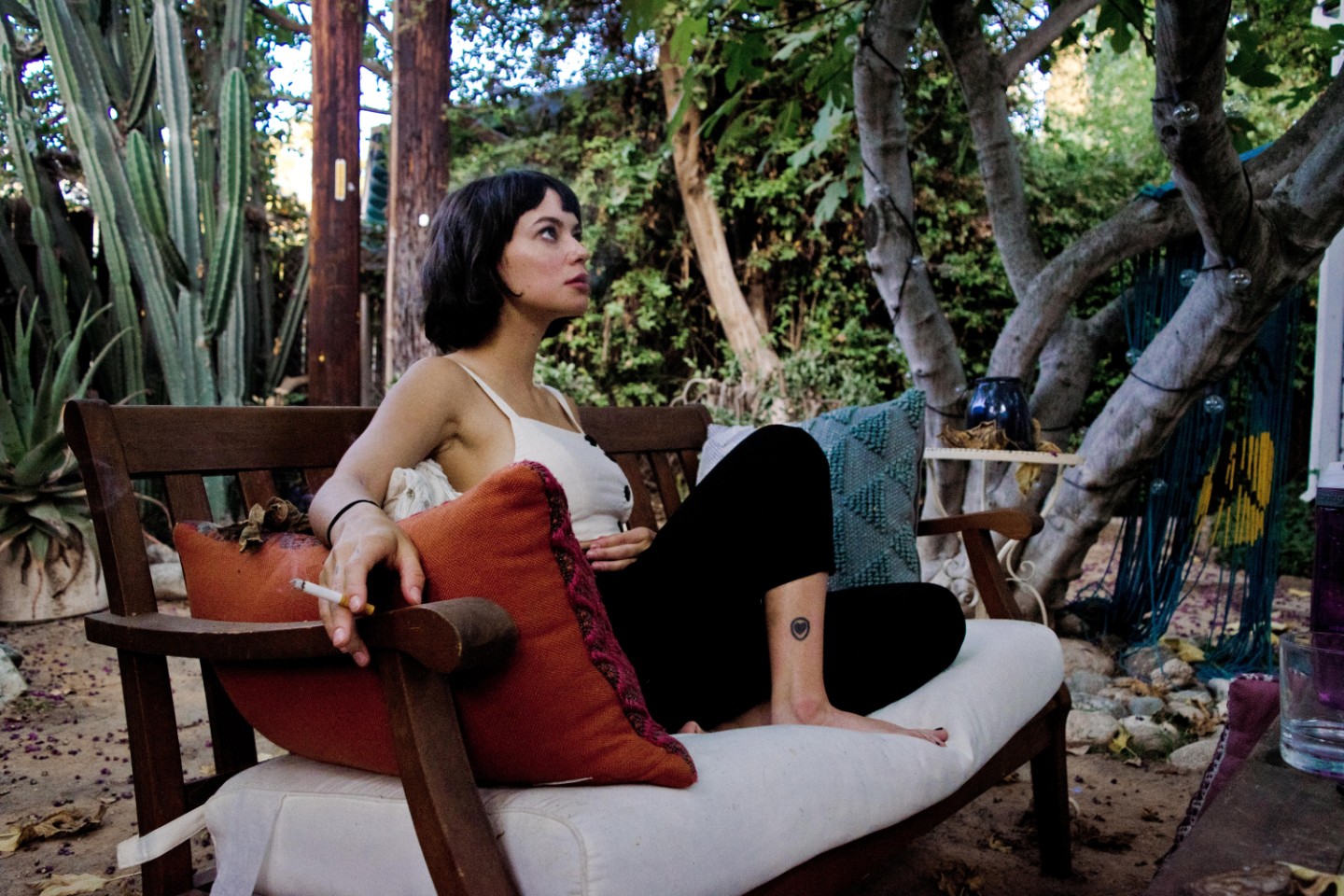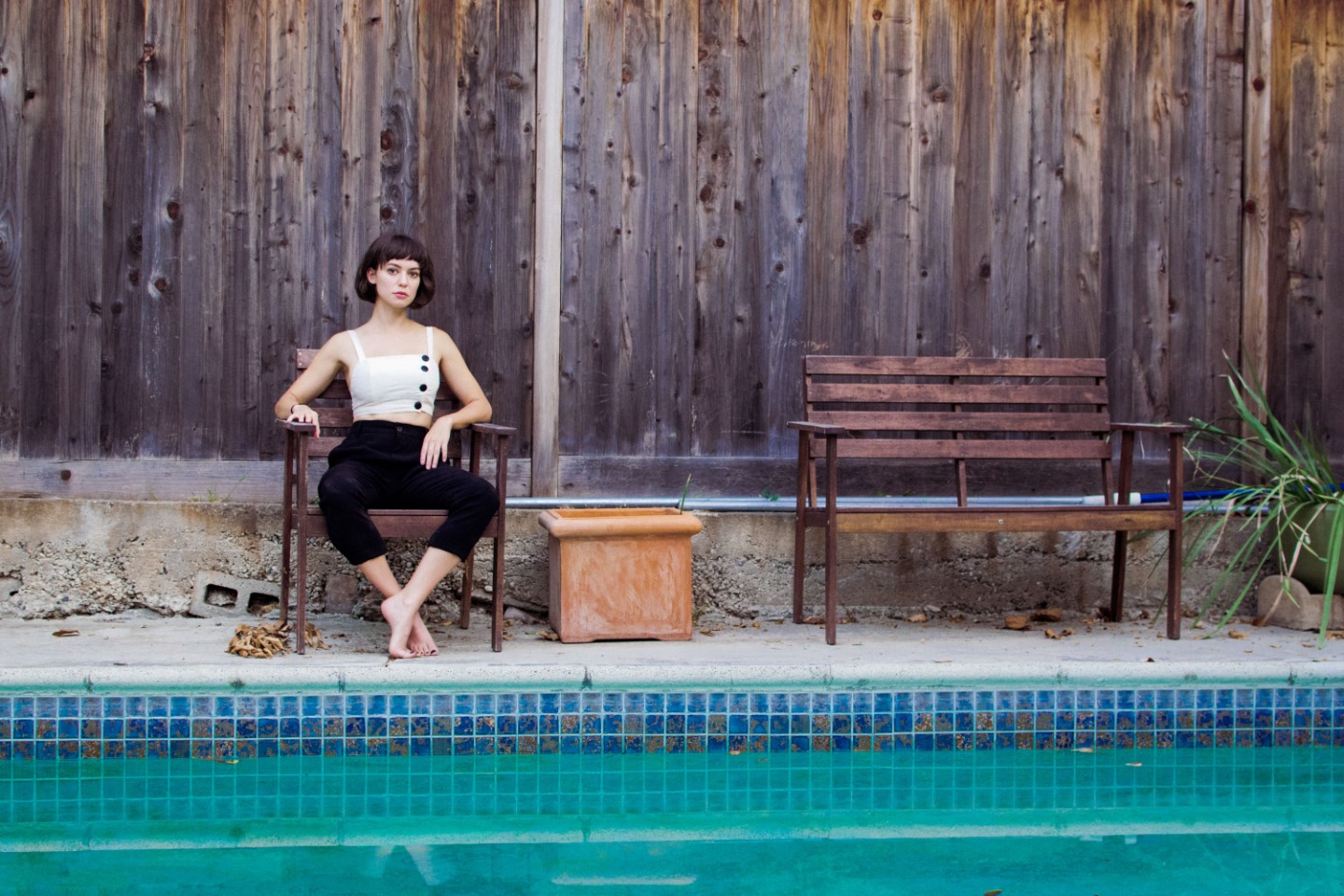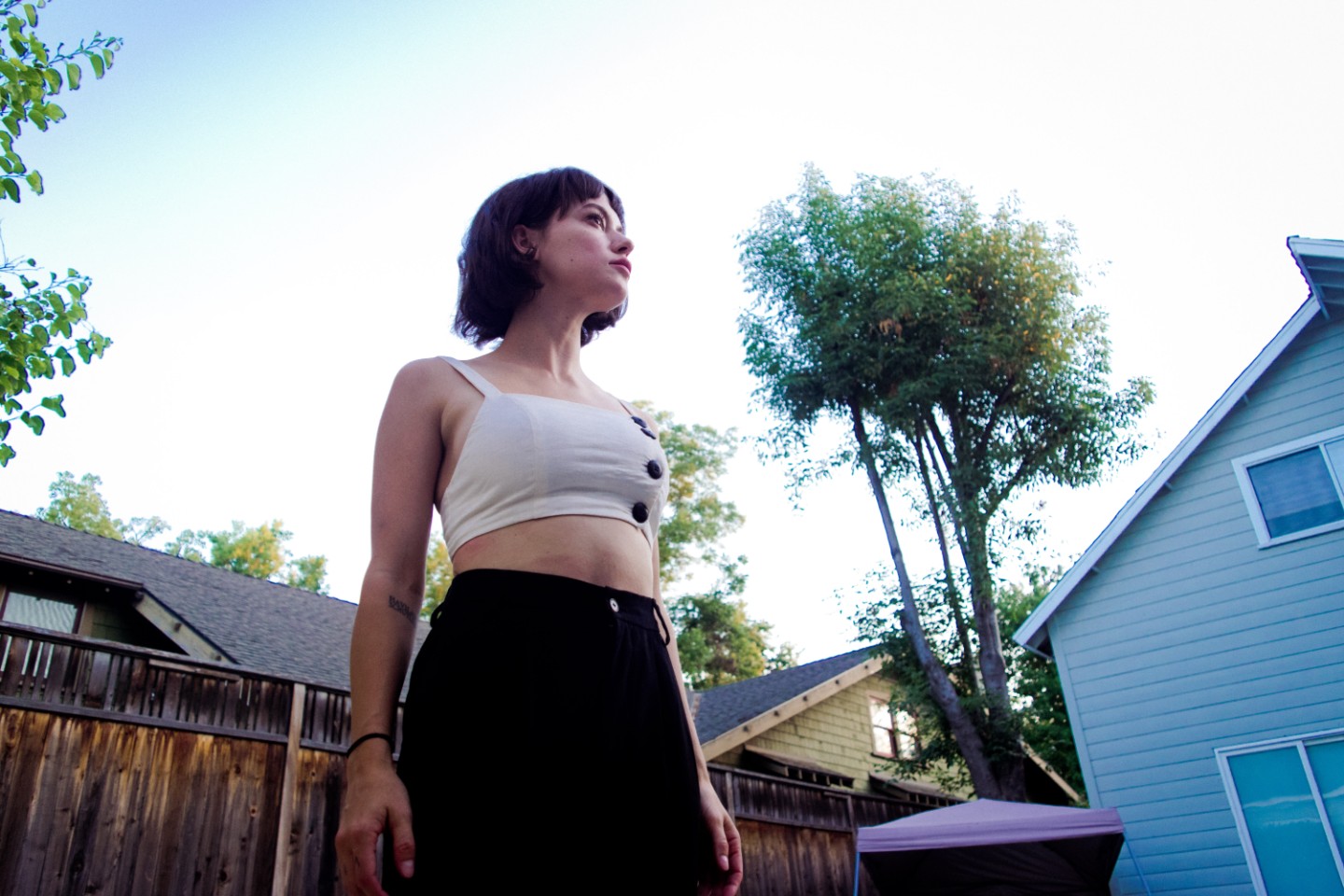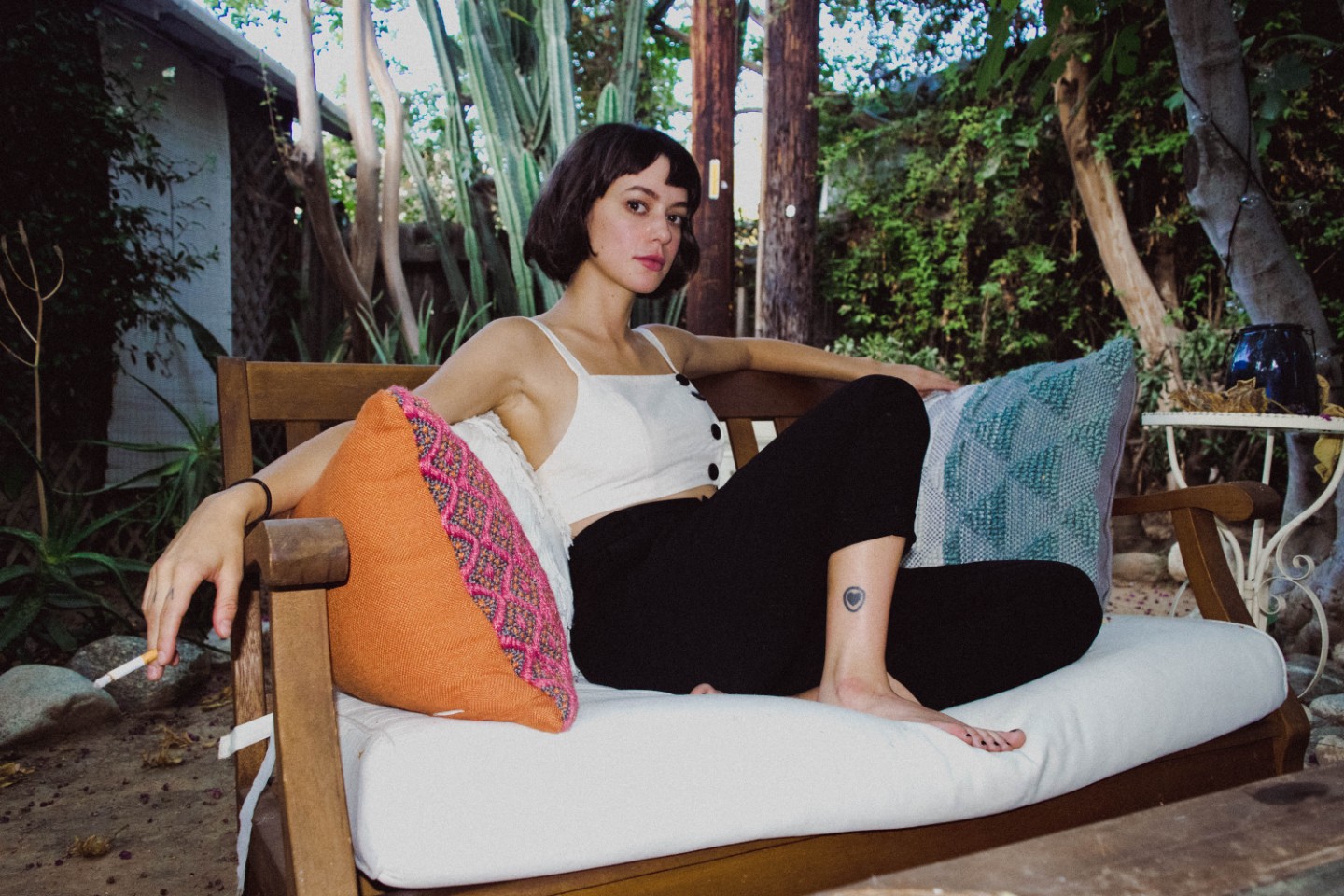“My new album is about self-discovery. I think that’s what it’s all about. Really starting to connect to myself.”
Meg Myers is the real deal. After a successful debut with her first full-length, “Sorry,” the alt-rock songstress took to the studio with producer Leggy Langdon to make what would become her latest, “Take Me To The Disco.” Her album had been nearly finished, but the pressure was on from Atlantic to produce a radio hit. Proving to be a difficult task, Myers cracked and came up with a grunge-rock stomper, her latest single “Numb.” But things still weren’t right between her and the label, so the two cordially parted ways. She then found herself musically homeless, with a shiny new batch of master recordings. That was when New York-based label 300 Entertainment entered the picture, offering a deal, and Myers was off to the races. Serving as the flagship for her new era, the anti-industry anthem “Numb” has been on the Alternative charts for 12 weeks now, and still climbing – and if that’s not rock ‘n’ roll, nothing is.
Interview and Photography by Andy Gorel
Andy: You’re originally from Nashville, do you have any musical roots there?
Meg: My dad played guitar, and my mom played guitar and sang. I always watched them. My first concert there was James Taylor. I didn’t start playing til I moved to Ohio or South Florida, around 12-13.
Do you think moving around those few times made it easier to come to LA to pursue music?
Yeah, I think so, because I never really knew what home felt like from moving around so much.
What were things like when you first got here? Young and alone in LA just trying to make it work?
Well I came out with a boyfriend when I was 19, and that didn’t last that long. Then I was alone, but I was making friends, and working. I got a gig as a barista, and from that I was working in restaurants. I was working in restaurants for like twelve years or something. I wouldn’t be able to do that now, but I was just wild and excited to be out of the house pursuing what I wanted to pursue. It all just kinda came together over time. There were some tough times, lonely times, throughout, but I found groups of people that led me to more groups of people, and it just kinda worked out. Money-wise it was really hard. I did some couch-surfing. I don’t know how I paid rent. I think I still owe my stepdad like twenty thousand dollars. I finally called him because I couldn’t afford it anymore, and was like “Pleeease. I know you’re not with my mom anymore, but.. “ [laughs].
What neighborhood were you in when you first got here?
Koreatown. It was a lot rougher then. That was over ten years ago. I was only there for three months, then I moved to West Hollywood for a few months. Then I moved to Silver Lake. I lived there for four years, and was like “I am so fucking over this.” I’m kind of a country person. I like wide open spaces. My best friend lived out here too, and she had moved out of the city. She found me a place near here, and then I moved out, of the city. After that I was like “I think I’m gonna go back to Nashville.” So I went back to Nashville for a while, and now I just got back out here a few months ago.
So after you first got to LA, you met Andy Rosen who would go on to produce your first few EPs. How’d you guys meet?
Well my best friend Rachel and I started a band called Dance Lion. Andy heard some of my acoustic stuff online on MySpace.
Oh man.
Yeah. I’m old! He reached out to me and came out to a show. It was our first show we ever played.. And it ended up being our last show [laughs]. And what’s funny about that is it said on it “Our first and last show.”
Oh, you knew!
Well no, we were joking around. But then he came to the show and was like “I wanna sign you to a production deal, and work with you. Like you and I talked about before, I’m not really good at jumping around. I’d love a side project one day, but that will become my project, because when I focus, that’s going to be my main thing.
Was there any music you guys really bonded over that spawned your early stuff?
Meg: We had really opposite backgrounds. I came from a lot of rock, and classic rock. And classical music. He came from like pop, hip-hop, 80s stuff. But I think we were both inspired by a lot of 80s stuff. I don’t know. We were just kinda opposites and brought it together.
How did Atlantic come into the picture? Were there a lot of players or other labels involved?
There were a lot of people. What’s the word? It has to do with dating. It starts with a “C.”
Courting?
Yeah that. It was like that. There was a lot of interest, but we just ended up going with them. We really liked the people there. I was just going with it.
Who was your A&R?
This guy Steve Robertson. He’s awesome. I love that guy. That’s kinda the reason I signed with them. I was like “I wanna work with this guy.” He actually signed Paramore.
That’s cool. I saw them last night. That’s why my voice is hoarse today [laughs]. Were you there?
No I wasn’t there, but I saw a video. One of my bandmates posted something. It was fucking, really good. So cool. He was saying it’s cool how bands reinvent themselves. Which is awesome. I feel like, not that it’s what we should do, but…
I mean, they went from Warped Tour to an arena. Paramore did that, and Katy Perry did that. I couldn’t name anyone else off the top of my head who’s done that. You could count Bring Me The Horizon if you want, but that was only in the UK. Which is different, because people love rock over there. Paramore grew.
And they’re doing it in a cool way.
Yeah, it’s not cheesy. It doesn’t feel forced.
Yeah it’s cool. I really love them.
“There’s a lot of chaos around you in the industry. Is she rock? Is she pop? This box, that box…’ And I was like ‘I don’t wanna be put in a box. I just wanna do me.'”
When you first started releasing music, you’d just signed with a major, you had a production deal, what was your vision like? Was it always as simple as “I’m just gonna do me?” Did it mess with your head at all?
Yeah, I think it did mess with my head quite a bit. I’ve always had this grounded knowing of what I wanna do, and that was always there. But there’s a lot of chaos around you in the industry, and people were confused about what I was. “Is she rock? Is she pop? This box, that box, this box..” And I was like “I don’t wanna be put in a box! I just wanna do me! And whatever that is, is what it is.” But that’s a tough thing, and I think there’s still a bit of question what I am because it is kind of it’s own thing. I don’t know [laughs].
I mean that’s good. That’s what it’s supposed to be. There are all kinds of things that go through your head when you sit down with a guitar to right a song, but like.. Just do it. Just do whatever comes out of you.
Just play! Yeah, exactly. There were a lot of moments like that for me. Or sometimes even in the studio when they’re asking a certain thing, I’ll be like, “I don’t really feel like doing that right now. I already did that, and it went well. So now I wanna do something else!” I think it’s good to challenge yourself to a certain extent, but don’t force yourself to be something, otherwise you just kinda lose your soul in it.
So “Sorry” was a major label alternative release, but it definitely didn’t sound like the wave of alternative you were on. What was inspiring that album?
Well I’ve never listened to what’s current. That’s something I’ve always struggled with. There are things, but the things I listen to are either underground, or not huge. I think I was struggling a bit finding stuff. I was listening to a lot of Nine Inch Nails, and I got back into some stuff I hadn’t been into for a while like The Cure, classical music – not really old school classical, just stuff from over the past 30 years, and soundtracks. A lot of instrumental stuff.
A part of that I think had to do with being on the road a lot, and being around so much rock. I just needed stuff without lyrics – calm, good for my soul. I was listening to a lot of Tori Amos actually. My producer got me really into her. And I think I was listening to Sinead O’Connor and stuff like that because people told me I reminded them of a lot of those early female artists, and Alanis Morissette. I opened myself up to listen to it because I had never gotten really into it before. And then I listened to it and was like, “Ok.. fuck yeah.”
It’s funny you say that, I just got super into Jagged Little Pill this year. I just saw Alanis in June. I listened to it on the way here actually.
I opened for her!
No you didn’t.
Yeah I did! It was like this acoustic thing a few months ago.
Kids today don’t realize, she was kinda the original badass rock chick. Of course there were several before her, but as far as being unafraid to say whatever she wanted in her music..
Yeah. Totally. Even on stage, the way she moved around. Everything. I think Sinead O’Connor was that way too. It was just like “Oh my god, she’s fucking incredible.” The album, The Lion and The Cobra – there are a few songs on that album that make you think “I just can’t believe a woman is singing like this.
“I feel really excited and connected to this album. I’m freaking out about how precious it is to me. But I also still feel like I have things I want to do.”
We keep trailing off, but back to the debut album, “Sorry”. Was it heavily A&R’d? Is the album that came out totally what you wanted to release?
Yeah, at that time in my life I felt really good about it, and I was so excited. But this is something I always do. No matter how good it is or how much I feel like I did what I wanted to do, there’s always other stuff I feel is in me that’s like “I haven’t done that yet!” Even this album, I feel really excited and connected to this album. I’m freaking out about how precious it is to me, and how excited I am to share it with people. But I also still feel like I have things I want to do.
That’s just human. No matter how great of a feat you accomplish, you’re always looking at the next one.
Yeah, or a different path.
Totally. So the album was kind of bold. Well, would you say it was kind of bold?
“Sorry?”
Yeah.
I think so. I would say bold. Yeah. Given what was happening at the time.
You said you’re really excited for “Take Me To The Disco” to be out tomorrow. What was your mindset before “Sorry?”
Well I was in a really weird place because I had been on the road touring so much before I released it. I was having a really hard time out on the road. It was rough. I wasn’t getting a lot of sleep. I was kinda like “Just fucking put it out.” [laughs] just like, “Let’s fucking get it out.” There was a lot of built-up excitement, and by being on the road for so long I was just going through so much that year that it was just a relief kind of for me.
But of course there was also excitement. “Desire” had done so well. It just got picked up and took off. Not to be negative [laughs]. I was excited! But also, you’re living life. Being a touring musician isn’t always easy. If I don’t sleep you don’t wanna see me. You don’t wanna experience the wrath.
Was it received like you thought it would be? Better? Worse?
I don’t think I had an expectation. I don’t think I ever do. I think it was just what it was. I think it felt like it was better to me than I had thought it would be, but it’s almost like you don’t have time to think about those things. I guess that’s what was happening to me. I didn’t even really know what to expect. I knew I created something that I had put a lot of heart into. A lot of fucking blood, sweat, and tears into, and it was, “Bam” – it was what it was.
That’s good then. It means you’re just releasing it, and living with it. So many people get so benchmark-driven. Like just make the music, and if it’s good, it will find its way.
Yeah! I think it’s good to have goals. But for some reason, my idea of success… I don’t know if I have one. It’s just being fulfilled – doing what I love for a living, and getting by on that. Big, small, awesome, it’s just whatever it is.
“I think it’s good to have goals. But for some reason I don’t know if I have one. It’s just being fulfilled – doing what I love for a living, and getting by on that.”
Was it a success to you?
Yes! It was! It was exactly what it needed to be for me. To be honest, I’m glad that it wasn’t any bigger than it was because I was going through so much that I needed to have some time off after that to really go within and learn some things, and deal with some things about myself. I wouldn’t have been able to do that if I was just famous or something. It was like “Ok that’s it!” and I needed to go away for a bit, and learn more about myself because there’s so much to learn.
Externally, looking from the consumer end, I think it was a success. I’m glad you feel that way as well.
Yeah, thank you! And I think also, it did what the albums of artists I love did. I’m happy it ended up like that in a more indie way. It wasn’t this huge commercial success. It was so underground, and I think that’s what I’m into. I’m glad it was sort of tame.
Are there any favorites you still have from that era?
“Make A Shadow” is always close to my heart, and I think “Feather” is one I really loved performing live. That was the last song on the album. And of course, there’s “The Morning After” which is an acoustic song about something that happened to me along time ago and was really personal. Of course I love “Desire” and “Sorry” and stuff, but I think I’ve gotten a little bit tired of those. But I love playing “Desire” live, just rocking out. It’s really fun. I play bass on it.
Any reason you play bass live?
Well it was my first instrument. My brother gave it to me, he wanted me to be in his band when I was 13. The band was called Feeling Numb.
Do you keep in mind that you’re the lead vocalist when you’re writing bass lines?
No, and what happened on this new record is I didn’t play instruments on a lot of this album because there were so many good players around me that I was like “I’m gonna let them do it. They’re fucking awesome.” Luckily I had that around me, but some of the songs are so hard on bass. One of them is called “Done.” Singing to it I was like, “I’m not gonna be able to do this.” It took me like a month to learn it. I would put aside two to three hours a day to learn it, and then once I did, I slowly started incorporating my vocals with it. I was like “I’m not gonna get this oh my God… I’m gonna get this!” And now it’s so easy! It’s so crazy your brain can do that! It’s just practice that’s all it is.
So in the time between the last cycle and this one you, were dropped by Atlantic and now you’re with 300 Entertainment right?
Yep, I got dropped then picked up.
How has getting dropped and then resigned been breathing life into this cycle?
Well I had already finished making the album when I was still on Atlantic. It was great. They let me work with the producer I wanted to work with, Leggy Langdon. That was exciting to just be able to do it. I had a lot of writing sessions, and I was just exhausted. I really really wanted to go with him and was excited that they let me work with him. It was a great experience. The A&R, Steve Robertson was in and out, but not really there. They weren’t too involved in the making of the record, they kinda let me do my thing. Until the end, they were like “Alright, we need radio singles, because they’re a very radio-driven label, as are a lot of major labels.” I was just like “Okay!”
So I kept going back and we kept writing more and more, and that was when I got frustrated and ended up feeling a lot of pressure. So I ended up writing “Numb,” which is my current single. That’s about the label, and what I was feeling at the time, what I was going through. That ended up being taken really well by them, but they were still like “What is this?” They were like, “Too many guitars,” and “What sounds like this right now?” It was different opinions all over the place. It was frustrating. I felt like I had already been hitting a wall with them a bit because they were like, “What are we gonna do with her? What is this?” and I was like “I’m me!” [laughs] and they were like “Okay crazy hippy girl!” [laughing]. I’m kidding. I think they were just like “Alright, we’re just gonna let her go, because, we love her and everything, but she’s just not right for this label,” and I was like “Yay! Thank you! [laughs] For letting me go! And letting me keep my record.” That was how it happened. It was very loving. I’m still in touch with my A&R.
“With my new label I feel like I have so much more creative freedom. I feel so much more like myself.”
So Atlantic paid for the album to be made and 300 picked it up?
Yeah, that’s what happened. It’s great, like holy shit. It wasn’t cheap to make either. I just feel so grateful for them for working with me. It just happened to be the wrong relationship in the end. Yeah, so 300, I ended up going with them. There were a few labels I was looking at, but I ended up going with them. I really love all the people over there, and I feel like they really got what I’m wanting to do, which is just what it is. It’s been going really well, and I feel like I have so much more creative freedom. I feel so much more like myself.
The new album, I listened to a little bit of it today. It seems to have a theme of struggle. Would you say that’s accurate?
Yeah, I think it was a journey. The whole album is about this journey I was on in the last year. In a lot of ways, like spiritually. And I’ve been in a lot of therapy, going through relationship stuff. There’s a lot of uncovering of earlier stuff from my childhood. I don’t know. It’s been a really intense spiritual path for me. Self-discovery, really getting to know myself more. I think that’s what it’s all about. Really starting to connect to myself. And, when you’re connecting to yourself, it’s not just awesome. It’s really hard to sit with yourself sometimes. I think you have to look at why you do certain things, and why you’ve had certain types of relationships. All of it. Taking it all, but also learning to have compassion for yourself. I think I have been really hard on myself for a long time. The album is about a crazy learning curve I’ve been on.
Any big sonic influences? What was the creative process like? Where’d you write and record most of it?
We wrote most of it in Topanga Canyon, and finished it up in Pasadena. Before we started making the record, we were making playlists for each other to get inspirations for songs. We have like twenty playlists, and each one is 20-40 songs. Stuff he likes, stuff I like. We both ended up having a lot in common with our tastes. We connected majorly on classical. There are strings on the new album too which was really exciting because we didn’t have enough budget for the album before to do that. We got a quartet for this album. That was my favorite part, being able to see that. There’s just so much feeling in strings.
Is it the truest side of yourself you’ve ever shown?
I think it represents me in a way that I didn’t think I’d even be able to pull off to this extent. Leggy pulled so much out of me on this, but it was so easy. It wasn’t exhausting. It was so natural and fluid. It was something I think we both connected on was the darkness. I was a little confused on the direction I wanted to go for this record, and it just kinda happened. A lot of these playlists we made had a lot of dark stuff. A lot of the 80s and 90s we maybe haven’t listened to since we were teenagers and brought back. We were like “Wait, it’s actually really cool. Let’s bring that into it.”
When you’re a teenager that’s when you’re discovering music and the world. That’s what this record was like for us. Both of us in our 30s creating this thing of inspiration again. We were both just so inspired.
“When you’re connecting to yourself, it’s not just awesome. It’s really hard to sit with yourself sometimes.”
What made you wanna work with him?
We had a writing session, and the first song was “Take Me To The Disco” that we wrote together. I just loved writing that with him cause he was down to let me get weird with my voice. Like in the chorus I’m like [imitating song, exaggerating deep voice] “Take me to the disco,” and I was like “Cool!” A lot of people would maybe be like, “Let’s find something more… not that,” [laughs]. I don’t know, he just let me explore things and find different sides of myself.
Then I came back and wrote two more songs, and two more songs. After we wrote “Torniquet” I was like “Oh my God, he has to do this.”
It’s due out tomorrow, are you excited?
I am. Yeah, I’m excited. It’s funny. There’s a song on there that keeps coming up for me, that I can’t wait for people to hear. It’s called “Little Black Death.” It’s just really dark, and painful. It’s also kind of tongue and cheek in the verses a little bit. I’m excited for all of them really. Let’s just do it.
So we kinda talked about this. You’ve been carrying the flag for a while for 90s influence. It’s kinda becoming hip now, but you’ve been doing it for a bit.
Yeah isn’t that funny? Like, “Come on guys get back on board! Finally.” I’m like “Dammit!” Now I’m gonna start getting into 50s or something [laughs].
Andy: [Laughs] That’s me with the 2000s. Any favorites from the 90s though?
Meg: I was really into Nirvana, Alice In Chains, Soundgarden. That whole time period.
Limp Bizkit?
Yeah!! Definitely! But wasn’t that 2000s?
Yeah, 90s/2000s.
I’m just gonna say Korn, and Marilyn Manson. Fuck yeah. No Doubt.
Hole? Stone Temple Pilots?
Fuck yeah. Both. Jewel, fuck yeah. Slipknot? Fuck yeah [laughs]. I was really into Slipknot. Oh my God, Tool. Deftones! Deftones were my number one. And more underground stuff too. Poison The Whale, Every Time I Die, stuff like that. Even goth is cool too. Punk rock, punk goth.
People love to say the guitar and the rock band are dying. Do you have anything to say about that?
I think it’s coming back. I think it’s only dead on radio. There are all these underground bands like brewing underneath, and then it’s just gonna explode.. If that doesn’t happen, I’m gonna kill myself [laughs].
Meg Myers on Instagram
Meg Myers on Facebook
Meg Myers on Twitter

